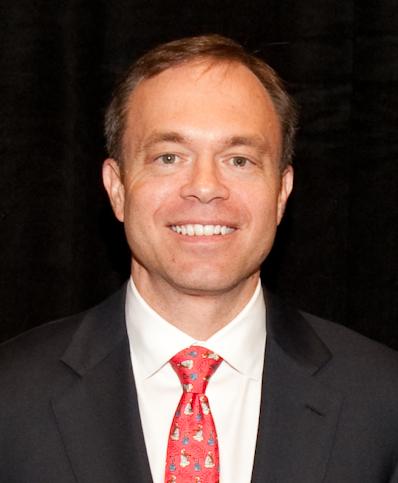Scott Gaille, ’95, Guest Lectures in Oil and Gas Law Class

The students in Oil and Gas Law benefited recently from the expertise of an alumnus guest lecturer, Scott Gaille, ’95, a longtime leader in the industry.
Gaille guest-taught Professor Richard Helmholz’s class to give students an insider’s look at the field, both in the United States and internationally. Gaille is founder of the Gaille Group, a business incubator for financial and energy companies, and Chief Compliance Officer and General Counsel for ZaZa Energy Corporation, where he is responsible for the corporation’s legal matters. He’s also a Director of Brenham Oil & Gas Corporation and an Adjunct Professor in Management at Rice University’s Jones Graduate School of Business. Previously, Gaille directed business development for Occidental Oil & Gas Corporation, where he started new business units in Africa, South America, and the Middle East.
Those experiences inspired many of the real-world stories Gaille shared with students during his hour-long class on March 7.
“I hope that the students gained more of an appreciation for the practical issues facing mineral rights owners in the United States and abroad and that some of the class will consider careers in the energy industry,” Gaille said after the class.
Helmholz said the students told him that Gaille’s real-world experience was a valuable perspective.
“They got something I couldn’t give them, which is contact with a person who’s dealt on the ground with foreign governments,” Helmholz said.
Maria Hassett, ’13, said she enjoyed Gaille’s teaching “because it reminded me of all the places a degree from the Law School can take you, depending on your interests. We’re not restricted to working in law firms for the rest of our lives unless we want to do that.”
Gaille lectured on acquiring rights to oil, gas, and other resources both domestically and abroad. He talked about the differences between public and private mineral rights in the United States, with their different transaction costs (higher costs for private) and structures of participation (a joint venture group, for example).
He spent most of the class talking about acquiring international mining rights. Most of the action is in developing countries, he explained, where property rights are much less stable and the risk is magnified. There’s also a lot more land or water space to have: A typical “block” in the Gulf of Mexico, off the U.S. coast, might come in a size of nine square miles, while a block size in Africa could be as large as 7,000 square miles.
“It’s a different kind of game than you have in the United States,” he said, detailing the ways corporations gain mineral rights from government through both negotiation and bidding processes. Gaille spoke of the enormous risk companies take, and the equally enormous potential payoff. A tract might have only a 1-in-5 or 1-in-6 chance of being profitable, but if it is, a well that cost $100 million can put several billion dollars on a company’s books, he said.
Unlike in the United States, Gaille added, contracts are seen as continuously negotiable, “living documents” that can be reworked if they’re not turning out in favor of the government selling the rights. That poses a special challenge for the legal brains behind these operations, said Gaille, as, “it can be very frustrating as an American company going abroad to take these rolling requests.”
Michael Lanahan, ’14, said it’s “not every day you learn how to bargain with foreign dignitaries over offshore tracts and horizontal wells.”
Gaille is “certainly the only lawyer I’ve met who bargains with foreign oil ministers on a regular basis. His presentation reminded me that with a solid legal education, a legal career can be an incredible adventure.”
Teaching at his alma mater was a special experience, Gaille said.
“I very much appreciated the opportunity to contribute to Professor Helmholz’s course. It had been 20 years since I took his Property class as a first-year, and returning to teach reinforced how great a foundation the Law School provided for my career.”